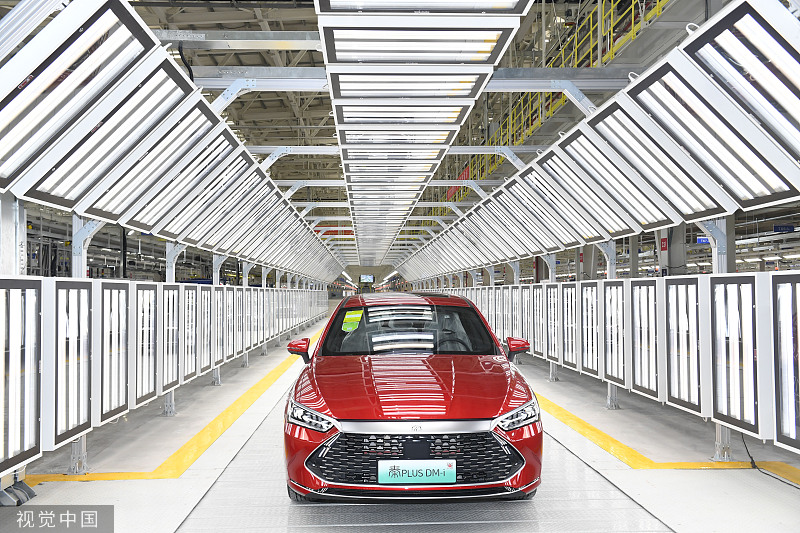
A BYD car rolls off the production line in Hefei, Anhui province, on June 30, 2022. [Photo/VCG]
SHENZHEN – As one strolls through the grounds of the College of Urban Transportation and Logistics at Shenzhen Technology University (SZTU) in South China, it is impossible to overlook the Beetle-shaped Volkswagen car sculpture placed next to the college building.
This sculpture is a testament to the inspiration and guidance that the German automobile industry has provided to its Chinese counterpart over the decades.
Out of the 15 colleges at SZTU, in the metropolis of Shenzhen, two are led by German deans. In 2018, Franz Raps was appointed as the inaugural dean of the College of Urban Transportation and Logistics, becoming the first foreign dean of the university.
It was Raps who introduced the racing studio concept to SZTU. “Designing and assembling racing cars is very popular among German technical universities. If the students can design and assemble a racing car and make it actually run, I believe they need not worry about finding a job in the future,” Raps said.
Ideal workplaces for the SZTU graduates are in the vicinity. Just 7 km away from the university, at the foot of a hill, lies the global headquarters of one of China’s leading new energy vehicle (NEV) manufacturers, BYD.
Last year, the company saw more than 1.88 million passenger and commercial vehicles roll off its production lines, most of which were NEVs. Since March last year, the company has ceased the production of automobiles solely powered by gasoline.
In October 2022, BYD announced that it signed a cooperation agreement with Sixt, a German car rental company, to provide NEV rental services for the European market. Together, the two companies are expected to jointly promote the electric transformation of the local car rental market.
Under the agreement, Sixt will purchase at least 100,000 NEVs from BYD in the next six years.
For a long time, the electronic information industry has been Shenzhen’s major economic pillar and preponderant domain. Today, a new cluster of promising NEV companies have emerged in this bustling metropolis.
Yu Xiquan, head of the municipal industry and information technology bureau, said that in terms of hardware, Shenzhen has built a closed loop of the core technology chain for NEVs, covering all aspects from research and development to manufacturing components and products including core modules, power batteries and precision structural parts.
In terms of software, batches of electronic information, internet and artificial intelligence enterprises in Shenzhen have forayed into the field of developing intelligent driving software, the official added.
Data from the China Association of Automobile Manufacturers have shown that China’s NEV production and sales saw explosive growth last year, reaching about 7.06 million and 6.89 million respectively, up 96.9 percent and 93.4 percent year-on-year.
The Shenzhen-based Sunwoda Electric Vehicle Battery Co., Ltd., received an order from Volvo Cars last year to supply the automaker with battery cell products. Previously, Sunwoda had obtained an order for power battery production for the Nissan-Renault alliance and become a supplier for the German automaker Volkswagen.
NEVs dominated discussions amongst the participants during the Sino-German Economic Forum held on March 29 in Shenzhen. Dong Juntian, a partner of Porsche Consulting Ltd. in Shanghai, said that when Chinese companies enter the European market, they can bring their partners in China’s supply chain to Europe, especially those in the battery industry.
A decade ago, the cooperation between China and Germany was clearly defined, as Germany provided technologies and China provided production, according to Raps.
“Today, China is developing at a rapid pace and becoming much more advanced in science and technology. I think Sino-German cooperation needs to find a new balance point,” Raps said.
